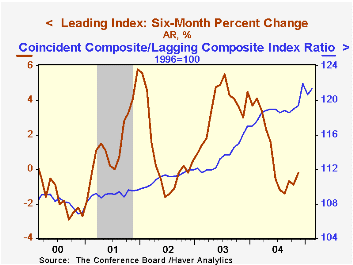 Global| Mar 17 2005
Global| Mar 17 2005Leading Indicators Tick Higher
by:Tom Moeller
|in:Economy in Brief
Summary
The Conference Board reported that the Composite Index of Leading Economic Indicators ticked 0.1% higher in February following an unrevised 0.3% decline the prior month. Six-month growth in the leaders remained negative at -0.2%. [...]

The Conference Board reported that the Composite Index of Leading Economic Indicators ticked 0.1% higher in February following an unrevised 0.3% decline the prior month. Six-month growth in the leaders remained negative at -0.2%. Growth in the leaders deeper than -2.5% preceded past US recessions.
The breadth of one month gain amongst the 10 components of the leading index improved markedly to 60% from a downwardly revised 25% in January. Fewer claims for unemployment insurance and higher stock prices were the main positive contributors to last month's leading index increase.
The leading index is based on eight previously reported economic data series. Two series, orders for consumer goods and orders for capital goods, are estimated.
The coincident indicators recovered 0.4% following a downwardly revised 0.6% decline in January. Six-month growth in the index was 3.3% and during the last ten years there has been an 84% correlation between six month growth in the coincident indicators and two quarter growth in real GDP.
The lagging indicators rose 0.4% and have been moving higher for most of the last year versus declines during the prior three years. Higher C&I loans account for much of the gain.
The ratio of the coincident to the lagging indicators which measures actual economic performance relative to excess rose 0.5% (3.1% y/y).
Visit the Conference Board's site for coverage of leading indicator series from around the world.
| Business Cycle Indicators | Feb | Jan | 6-Month Chg | 2004 | 2003 | 2002 |
|---|---|---|---|---|---|---|
| Leading | 0.1% | -0.3% | -0.2% | 3.0% | 1.3% | 2.2% |
| Coincident | 0.4% | -0.6% | 3.3% | 2.6% | 0.4% | -0.5% |
| Lagging | 0.4% | 1.0% | 1.0% | -2.0% | -1.9% | -2.3% |
Tom Moeller
AuthorMore in Author Profile »Prior to joining Haver Analytics in 2000, Mr. Moeller worked as the Economist at Chancellor Capital Management from 1985 to 1999. There, he developed comprehensive economic forecasts and interpreted economic data for equity and fixed income portfolio managers. Also at Chancellor, Mr. Moeller worked as an equity analyst and was responsible for researching and rating companies in the economically sensitive automobile and housing industries for investment in Chancellor’s equity portfolio. Prior to joining Chancellor, Mr. Moeller was an Economist at Citibank from 1979 to 1984. He also analyzed pricing behavior in the metals industry for the Council on Wage and Price Stability in Washington, D.C. In 1999, Mr. Moeller received the award for most accurate forecast from the Forecasters' Club of New York. From 1990 to 1992 he was President of the New York Association for Business Economists. Mr. Moeller earned an M.B.A. in Finance from Fordham University, where he graduated in 1987. He holds a Bachelor of Arts in Economics from George Washington University.
More Economy in Brief
 Global| Feb 05 2026
Global| Feb 05 2026Charts of the Week: Balanced Policy, Resilient Data and AI Narratives
by:Andrew Cates






